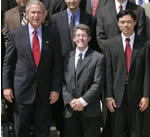
On June 13, 2005, two UIUC researchers, Neil Kelleher and ChengXiang Zhai (Computer Science) were named recipients of the 2004 Presidential Early Career Award for Scientists and Engineers, the nation's highest honor for professionals at the outset of their independent research careers. Fifty-eight researchers were honored in a ceremony presided over by John H. Marburger III, Science Advisor to the President and Director of the White House Office of Science and Technology Policy.
Professor Kelleher has established a first-class research program in proteomics, the study of the full set of proteins encoded by an organism's DNA. He is regarded by many as the leader of a new "top-down" approach to proteomics, in which proteins are analyzed intact, or after cleavage into a few large fragments. Dr. Kelleher uses Fourier transform mass spectrometry combined with new computer algorithms to analyze the data and provide information about how proteins work on the molecular and genomic level.
Professor Kelleher received a B.S. and B.A. from Pacific Lutheran U. in 1992, a Fulbright Fellowship the following year, and a Ph.D. from Cornell U. in 1997. After a NIH Postdoctoral Fellowship at Harvard Medical School with Chris Walsh, Kelleher joined the faculty at UIUC in 1999 as a bioanalytical chemist. He has previously been named a Fellow of the Arthur P. Sloan Foundation, and is presently a Packard Fellow. He has received two awards from the Camille and Henry Dreyfus Foundation, the first being a Dreyfus Award for New Investigators, the second a Camille Dreyfus Teacher-Scholar Award. He has also been the recipient of a Lilly Analytical Chemistry Award, and a NIH Career Transition Award. He was a Burroughs Wellcome Fund Young Investigator and a Searle Scholar.
The Presidential Early Career Awards for Scientists and Engineers, established in 1996, honors the most promising researchers in the nation within their fields. Eight federal departments and agencies annually nominatescientists and engineers at the start of their independent careers whose work shows exceptional promise for leadership at the frontiers of scientific knowledge during the twenty-first century. Participating agencies award these talented scientists and engineers up to five years of funding to further their research in support of critical government missions.
Dr. Kelleher was nominated by the National Institutes of Health.
"Professor honored for his top-down protein approach," News Gazette, 8/10/05.